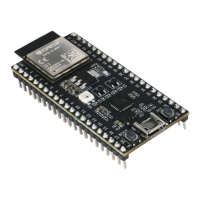Chapter 2. API Reference
• host: SPI peripheral to free
esp_err_t spi_slave_queue_trans(spi_host_device_t host, const spi_slave_transaction_t
*trans_desc, TickType_t ticks_to_wait)
Queue a SPI transaction for execution.
Queues a SPI transaction to be executed by this slave device. (The transaction queue size was specified when the
slave device was initialised via spi_slave_initialize.) This function may block if the queue is full (depending on
the ticks_to_wait parameter). No SPI operation is directly initiated by this function, the next queued transaction
will happen when the master initiates a SPI transaction by pulling down CS and sending out clock signals.
This function hands over ownership of the buffers in trans_desc to the SPI slave driver; the application
is not to access this memory until spi_slave_queue_trans is called to hand ownership back to the
application.
Return
• ESP_ERR_INVALID_ARG if parameter is invalid
• ESP_OK on success
Parameters
• host: SPI peripheral that is acting as a slave
• trans_desc: Description of transaction to execute. Not const because we may want to write
status back into the transaction description.
• ticks_to_wait: Ticks to wait until there’s room in the queue; use portMAX_DELAY to never
time out.
esp_err_t spi_slave_get_trans_result(spi_host_device_t host, spi_slave_transaction_t
**trans_desc, TickType_t ticks_to_wait)
Get the result of a SPI transaction queued earlier.
This routine will wait until a transaction to the given device (queued earlier with spi_slave_queue_trans) has
succesfully completed. It will then return the description of the completed transaction so software can inspect
the result and e.g. free the memory or re-use the buffers.
It is mandatory to eventually use this function for any transaction queued by spi_slave_queue_trans.
Return
• ESP_ERR_INVALID_ARG if parameter is invalid
• ESP_OK on success
Parameters
• host: SPI peripheral to that is acting as a slave
• [out] trans_desc: Pointer to variable able to contain a pointer to the description of the
transaction that is executed
• ticks_to_wait: Ticks to wait until there’s a returned item; use portMAX_DELAY to never
time out.
esp_err_t spi_slave_transmit(spi_host_device_t host, spi_slave_transaction_t *trans_desc, Tick-
Type_t ticks_to_wait)
Do a SPI transaction.
Essentially does the same as spi_slave_queue_trans followed by spi_slave_get_trans_result. Do not use this
when there is still a transaction queued that hasn’t been finalized using spi_slave_get_trans_result.
Return
• ESP_ERR_INVALID_ARG if parameter is invalid
• ESP_OK on success
Parameters
• host: SPI peripheral to that is acting as a slave
• trans_desc: Pointer to variable able to contain a pointer to the description of the transaction that
is executed. Not const because we may want to write status back into the transaction description.
• ticks_to_wait: Ticks to wait until there’s a returned item; use portMAX_DELAY to never
time out.
Structures
Espressif Systems 386
Submit Document Feedback
Release v4.4

